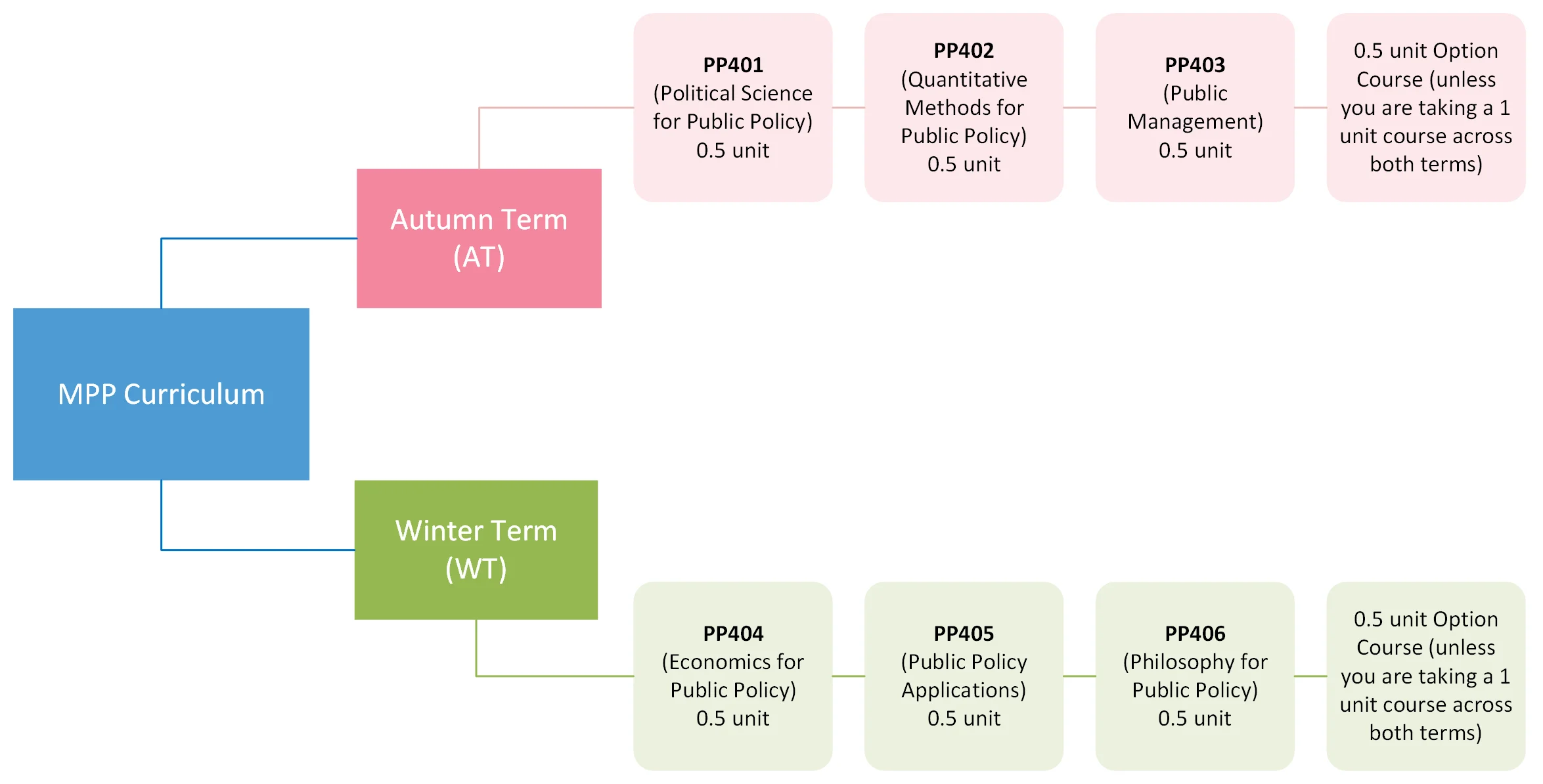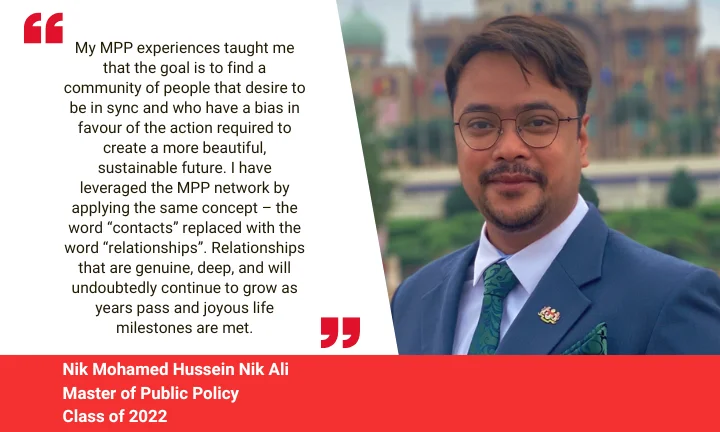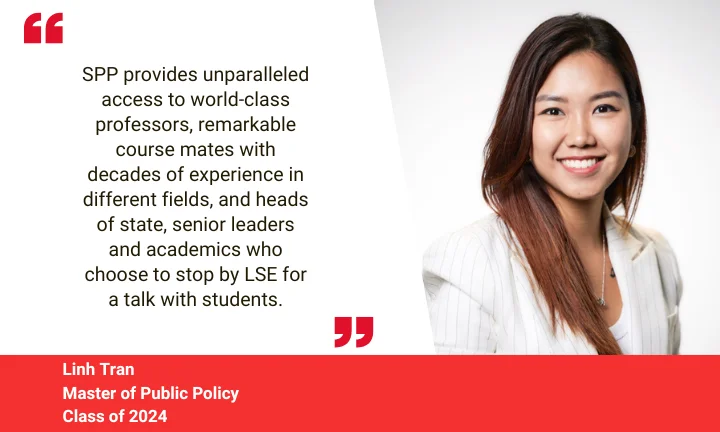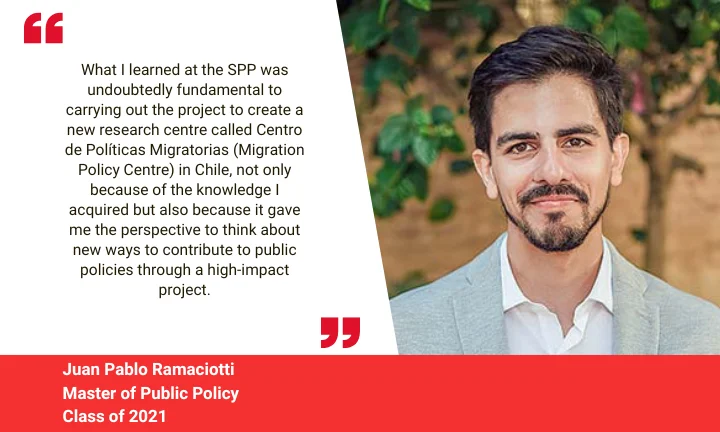Master of Public Policy
Applications open for 2026 entry
The Master of Public Policy (MPP) is an intensive 9-month programme designed for professionals who want to enhance their knowledge and analytical skills to effectively address complex public policy challenges, and advance their career in any policy-relevant sector.
The MPP offers public policy education that is designed for operating in today’s world. Organisations today are faced with vast amounts of information and competing opinions with different calls to urgent action. Successful policy-makers need to understand and navigate between the different opinions and perspectives of economists, lawyers, financiers and philosophers in order to make effective policy decisions.
The intensive 9-month programme enables students to take a short career break to join an experienced global cohort, gain new perspectives and develop an understanding of how to analyse and navigate the different perspectives which form the "craft of government". This integrates theory and analysis, politics, and implementation of policy.
Students will develop a unique understanding of the complex challenges of contemporary governance across core discipline perspectives including economics and econometrics, political science, quantitative methods, public management and philosophy. This offers tools and knowhow to understand and address the world’s most pressing public policy challenges. with a unique understanding of the complex challenges of contemporary governance, providing a real-world context to the policy-making skills you will develop.
Whether moving into public, private, international, or non-profit roles, our graduates will take with them enhanced knowledge, expanded thinking and elevated skills to be able to make formidable contributions to public policy and advance in the next stage in their career.
Key features:
- A strong discipline focus core, plus room to specialise.
- Opportunity to build your professional network and learn from a diverse global cohort, all with well-established policy-relevant experience.
- Be able to better understand and challenge the advice received from experts.
- Develop a comprehensive understanding of the public management profession and the tools and approaches needed to reform and enhance public service provision.
- An intensive 9-month programme to prepare you for the next step in your career and help you to return to your profession equipped and confident to take on new challenges.
The SPP has had a long-lasting impact on my career. When I came to LSE, I was clear on the new subjects I wanted to learn and the familiar areas where I wanted to build greater depth. The MPP provided me with all the necessary tools, theoretical grounding, and real-world examples.
Ishita Aryan, MPP Class of 2023
MPP overview
| Applications open | October 2025 |
| Application deadline | We encourage applicants to apply by our early deadline 22 January 2026, however we accept applications on a rolling basis and will close to applications once places are full. |
| Duration and format | Nine months, full time only |
| Expected intake | 70-90 |
| Minimum entry requirements | Upper second class honours (2:1) degree or equivalent in any discipline. In addition, applicants must have at least five years of policy-relevant experience, though exceptions may be granted for outstanding candidates with slightly less experience. GRE/GMAT: Not required English Language requirements: 'Higher' see 'your application' section below |
| Location | Houghton Street, London |
MPP programme
Prior to your arrival at LSE you will receive details about optional readings and online learning materials which are designed to help you to prepare for the programme.
During August and early September we will offer a 5-week online course, Introduction to Mathematics and Statistics for Public Policy, in preparation for the MPP core course Quantitative Methods for Public Policy (PP402).
From mid-September (exact date TBC) you will need to attend MPP Welcome events and introductory teaching sessions. These will take place prior to the start of the LSE Autumn Term dates. The welcome sessions include campus enrolment, a programme introduction, and various introductory and practical sessions covering different opportunities and available support for your time at LSE.
The programme consists of four units in total – including three units of core courses, listed below, and a further one unit of options courses from a range of courses from within the LSE School of Public Policy.
This combines a fundamental grounding in core disciplines that are central to public policy, and allows you to tailor your options to your own interests and career goals. Some of the option courses will require prior study in economics, and would require the permission of the Course Convenor. Indicative options are listed below.

Political Science for Public Policy*
You will learn how to understand and analyse empirically the political context of policymaking. This will include how political behaviour (such as voting behaviour, elections and lobbying), interacts with political institutions (such as electoral systems, different models of government or central banks) to create political outcomes (such as economic policies, development aid and ethnic conflict).
Quantitative Methods for Public Policy*
This course will introduce you to some of the key principles and tools of quantitative evaluations which underpin policy interventions and outcomes. The emphasis is on the practical application of these tools to real-life situations, including the difference between correlation and causality, the use of randomised experiments, and understanding of how and when difference-in-differences regressions can be effectively used.
Public Management*
This course offers an intensive introduction into key literatures and themes in the study of public management. Applied to both developed and lesser developed world contexts, you will learn about public sector reform, coordination and collaboration, bureaucracies, professionalism and motivation, performance management, crisis management, leadership, institutional capacity building, cutback management and organisational learning. Your teaching will be paired with insights to the success, or otherwise, of different models and approaches.
Economics for Public Policy*
On this course, you will learn the key principles of economic policy-making. Both micro- and macro-economics will be covered, including price theory, understanding markets, externalities, public goods, principal-agent problems, economic growth, inflation business cycles, unemployment, and fiscal and monetary policies.
Public Policy Applications*
This course will introduce students to the application of social science literatures to concrete policy issues. It will be organised around topics which are being actively discussed in both the policy and academic spheres/realms/domains.
This course will emphasise illustrating how different theoretical and disciplinary approaches analyse a particular policy topic and problem. The precise policy topics will be decided each year, depending on the academic and practitioner availability. We attract from either the cutting edge of a particular research topic or those who are working directly on a topic area.
Philosophy for Public Policy*
This course has been designed to help you develop the skills and insight to apply philosophical reasoning to your understanding and practice of the 'craft of government'. It includes a strong grounding in moral and political philosophical principles and emphasises their application in modern policy-making toolkit. You will study a range of philosophical theories and concepts, then discuss and learn to evaluate them by focusing on specific policy proposals. Taught by leading LSE philosophers, the emphasis is on applying theory and concept in practical and policy-relevant ways.
Option courses (electives)
You will also select courses to the value of one unit from a range of options.
For the most up-to-date list of optional courses please visit the relevant School Calendar page.
Please note that the nine-month and ten-month full time master's programmes are not compliant with the Bologna process, which may affect the extent to which they're recognised.
We may need to change, suspend or withdraw a course or programme of study, or change the fees due to unforeseen circumstances. We’ll always notify you as early as possible and recommend alternatives where we can.
The School is not liable for changes to published information or for changing, suspending or withdrawing a course or programme of study due to events outside our control (including a lack of demand, industrial action, fire, flooding or other damage to premises).
Places are limited on some courses and/or subject to specific entry requirements so we cannot therefore guarantee you a place.
Changes to programmes and courses may be made after you’ve accepted your offer of a place – normally due to global developments in the discipline or student feedback. We may also make changes to course content, teaching formats or assessment methods but these are always made to improve the learning experience.
For full details about the availability or content of courses and programmes, please take a look at the School’s Calendar, or contact the relevant academic department.
Some major changes to programmes/courses are posted on our updated graduate course and programme information page.
MPP students
The MPP attracts a highly diverse range of students from all over the globe. Our 2024 cohort of 68 students represent 27 nationalities
Our MPP students have a range of professional backgrounds and experience and have an average of 10 years' working experience.
We welcome students from wide-ranging areas of expertise including government administration, education, healthcare, consultancy, financial services, and many more. Their combined experience encourages a mature and reflective approach to study that draws on professional skills and experience gained prior to the MPP.
This diversity is a major strength, providing many different national, economic and societal perspectives to problems and solutions of public policy.
Association of Public Policy Students (APPS)
The Association of Public Policy Students (APPS) is an elected body of SPP students that serve as a resource for the student community. Throughout the academic year, the APPS’s numerous committees and initiatives provide opportunities for students to engage with other classmates in professional and social activities.
Public Sphere Journal (PSJ)
The Public Sphere Journal (PSJ) is a journal of international policy studies produced by SPP students which features evidence-based research in economic policy, public management, international affairs, development studies and social policy. The PSJ offers students an opportunity to combine their unique professional and personal experiences to create a journal of international policy studies, from the initial call for papers through to the print and launch.
Womxn’s Network
The School of Public Policy’s (SPP) Womxn’s Network is a student-run organisation focused on the advancement and empowerment of students within the SPP and broader LSE community who are marginalised by the intersectionalities of gender and/or sexuality. The Network aims to further encourage the inclusion of marginalised voices within policymaking through various events and forums designed to promote learning and open discussion.
External networks
Turner MBA Investment Impact Network and Training (MIINT)
The Turner MBA Investment Impact Network and Training (MIINT) Competition gives students the opportunity to gain hands-on experience in impact investing by sourcing and conducting due diligence on real-world, early-stage impact investment opportunities. The MIINT is supported by LSE's Marshall Institute. Hear from our 2025 MIINT participants.
Global Public Policy Network (GPPN)
The Global Public Policy Network (GPPN) is a partnership between 7 prestigious universities in public policy. GPPN is a platform for institutional partnership, research collaboration, and student exchange. Members of the GPPN have organised an annual international conference for the students and deans from member schools to meet and discuss pressing issues of global public policy. GPPN members have also established exchange and dual degrees programs, allowing students to benefit from this international network of the most prestigious public affairs schools in the world. Hear from our 2024 GPPN conference participants.
LSE student societies and activities
Your time at LSE is not just about studying, there are plenty of ways to get involved in extracurricular activities. From joining one of over 200 societies, or starting your own society, to volunteering for a local charity, or attending a public lecture by a world-leading figure, there is a lot to choose from.
Life in London
As a student at LSE you’ll be based at our central London campus. Find out what our campus and London have to offer you on academic, social and career perspective.
LSE is based on one campus in the centre of London. Despite the busy feel of the surrounding area, many of the streets around campus are pedestrianised, meaning the campus feels like a real community.
London is an exciting, vibrant and colourful city. It's also an academic city, with more than 400,000 university students. Whatever your interests or appetite you will find something to suit your palate and pocket in this truly international capital. Make the most of career opportunities and social activities, theatre, museums, music and more.
Want to find out more? Read why we think London is a fantastic student city, find out about key sights, places and experiences for new Londoners. Don't fear, London doesn't have to be super expensive: hear about London on a budget.
Professional development, alumni and careers
SPP Professional Skills Accelerator
The SPP also offers an extensive and tailored programme of Professional Skills for Public Policy which is especially designed to complement the skills and insights that you gain as part of your programme curriculum and equip you with the necessary skills for the next step in your career.
You will benefit from a series of training workshops with experienced practitioners and experts in key areas of professional development such as leadership, negotiation and persuasive communication.
Alumni mentorship and Q&As
Our alumni also connect regularly with our students throughout their studies and share their expertise through our alumni/student mentoring scheme and our career Q&A series.
Policy in Practice (PiP) seminars
We run regular seminars through the year to connect you with policy practitioners in a range of fields, either to learn more about the work of particular organisations and sectors or to develop new skills. These seminars provide students with an opportunity to connect classroom learning to real world scenarios.
The SPP has an active global community of over 2,300 alumni. Our international network of alumni not only transform the world around them by designing policy to tackle some of the world’s leading problems in the top levels of government, international organisations, and NGOs – but also makes our community a vibrant and supportive one long after graduation.
As well as belonging to LSE School of Public Policy’s alumni network, SPP students will also belong to LSE’s prestigious alumni network of over 220,000 alumni across the world.
Alumni and student connections
Our alumni connect regularly with our students throughout their studies and share their expertise through our alumni/student mentoring scheme and our career Q&A series.
Alumni Benefits
As part of LSE SPP’s alumni engagement programme our alumni stay connected via our regular newsletters and in-person and virtual professional development and social events throughout the year. Our annual 'Alumni Symposium' offers a space for alumni to reconnect and benefit from the lifelong SPP network. Hear our alumni discuss the benefits of being able to reconnect at LSE to hear from expert panels and share their experiences at the 2025 Alumni Symposium, which focused on themes of 'The New Geoeconomics: Policy making in a Fragmented World'.
Alumni in Action
Learn more about our alumni and how they are making an impact around the world
Career support
At the heart of the SPP is an emphasis on helping our students shape and enhance their future careers in policy-related fields. Studying at the LSE School of Public Policy is an excellent career decision with employers across the globe attracted both to the intellectual rigour and the practical applications of our curriculums.
We understand the particular needs of early to mid-career policy professional seeking their next career step or looking to change direction, and the need to assess and reflect on your skills and experiences to date; the breadth of our curriculums will allow you to widen the perspectives through which you view your working life.
LSE Careers offers students a programme of support throughout their studies and after graduation.
In particular, students at LSE SPP have access to:
- Professionals at LSE - a network and programme of career management and professional development to support our working professional community.
- one-to-one coaching in all aspects of career planning and professional development with the LSE School of Public Policy's Careers Consultant
- a weekly SPP Careers newsletter, compiled by a student employee, with relevant short-term and long-term job opportunities and events
- Q&A events with alumni working in particular sectors of interest such as international organisations and consultancy
- SPP networking evening with employers
- access to LSE Careerhub, listing hundreds of opportunities, from short-term volunteering and internships to full-time positions for experienced professionals
- Careers Impact Sessions which takes place early in year 1, followed by a networking evening with employers in relevant sectors
- specialist careers seminars run by LSE Careers, including sessions on CVs and cover letters, career management, networking, interviews and advice specific to particular employment sectors
Many leading organisations give careers presentations at the School during the year. LSE Careers has a wide range of resources available to assist students in their job search. Find out more about the support available.
Graduate Destinations
Our graduates go on to pursue careers in a wide range of sectors with popular destinations including; Government and Politics, Consultancy, Financial Services, NGOs & Charities, Data, Research & Think Tanks, International Development and Aid, Public Policy, and International Finance and Trade.
Find out more about our alumni and their career journeys after graduation.
School of Public Policy: Student community
Hear more about professional development opportunities and networks for our SPP students.

Your application
Minimum entry requirement
Upper second class honours (2:1) degree or equivalent in any discipline.
At least five years of policy-relevant experience, though exceptions may be granted for outstanding candidates with slightly less experience.
English language requirement: 'Higher' - see English language requirements
Who we are looking for
Our diverse cohort is one of the key strengths of our MPP programme. In particular the MPP is designed for professionals who have 5 or more years of policy-relevant experience.
We aim to bring together a cohort of passionate policy professionals who represent a wide range of nationalities, experiences and backgrounds, thus enriching the peer-to-peer learning experience.
We welcome applications from individuals from a range of academic disciplines and professional backgrounds (with 5+ years experience) who can demonstrate a passion for public policy and making a positive impact.
Excellent candidates will possess a strong academic record and be able to demonstrate a commitment to public service as well as a clear understanding of the MPP and how they will benefit from the programme.
Whilst the MPP programme is designed to provide rigorous training in areas of econometrics and quantitative methods, there will be opportunities for individuals with less experience in these areas to develop or refresh their skills via online learning materials prior to the programme starting.
Find out more about our MPP students and their backgrounds in our 'Our Students' section below.
Information for international students
If you are applying to LSE from outside of the UK then take a note of the UK qualifications we require for your programme of interest and refer to our Information for International students page where you can view entry requirement by country.
Competition for places at the School is high. This means that even if you meet the minimum entry requirement, this does not guarantee you an offer of admission.
When to apply
We encourage all applicants to apply as early as possible once applications open in October. All applicants who want to be considered for a SPP scholarship will need to submit an application for admission by 22 January 2026 in order to be eligible for consideration for a SPP scholarship.
Whilst we will consider applications for admission after this date, our applications will close once spaces are full, so early applications are encouraged.
How to apply
LSE's 'How to apply' webpages guide you through the application process and link to the application form.
You can also view the Application Top Tips information by Kathryn Ward, Graduate Admissions Premium Service Manager, on how you can make the most of your application.
How your application will be assessed
We welcome applications from all suitably qualified prospective students and want to recruit students with the very best academic merit, potential and motivation, irrespective of their background.
We carefully consider each application on an individual basis, taking into account all the information presented on your application form, including your:
- academic achievement (including predicted and achieved grades)
- relevant professional experience
- statement of academic purpose
- two references (see guidance on professional and academic references)
- CV
See further information on supporting documents
You may need to provide evidence of your English language proficiency. See our English language requirements.
Fees and funding
Every graduate student is charged a fee for their programme.
The fee covers registration and examination fees payable to the School, lectures, classes and individual supervision, lectures given at other colleges under intercollegiate arrangements and, under current arrangements, membership of the Students' Union. It does not cover living costs or travel or fieldwork.
Tuition fees 2026/27 for the Master of Public Policy (MPP)
Home students: £45,300
Overseas students: £45,300
The Table of Fees shows the latest tuition amounts for all programmes offered by the School.
Fee status
For this programme, the tuition fee is the same for all students regardless of their fee status. However, any financial support you are eligible for will depend on whether you are classified as a home or as an overseas student, otherwise known as your fee status. LSE assesses your fee status based on guidelines provided by the Department of Education.
Further information about fee status classification.
Fee reductions
Students who completed undergraduate study at LSE and are beginning taught graduate study at the School are eligible for a fee reduction of around 10 per cent of the fee.
Cost of Living
LSE School of Public Policy scholarships
In addition to our needs-based awards, LSE also makes available scholarships for students from specific regions of the world and awards for students studying specific subject areas. The School of Public Policy (SPP) offers programme and country specific scholarship awards.
Find out more about SPP specific awards and how to apply.
LSE Scholarships
This programme is eligible for needs-based awards from LSE, including the Graduate Support Scheme, Master's Awards, and Anniversary Scholarships.
Selection for any funding opportunity is based on receipt of an offer for a place and submitting a Graduate Financial Support application, before the funding deadline.
Funding deadline for LSE needs-based awards from LSE is TBC.
Chevening & External Scholarships
A number of our MPP students are successful Chevening Scholarhip awardees who have received full funding to study with us. Find out more about the Chevening Scholarship scheme and check your eligibility to apply.
Find out about Chevening Scholarships
Government tuition fee loans and external funding
A postgraduate loan is available from the UK government for eligible students studying for a first master’s programme, to help with fees and living costs. Some other governments and organisations also offer tuition fee loan schemes.
Find out more about tuition fee loans
Further information
Next steps
SPP Programme Information Sessions
View our MPP information session recording. Hear from MPP Programme Director, Dr Simon Bastow and recent graduates Sachin and Andrea about the MPP programme.
Throughout the year we will be hosting online SPP programme information sessions for prospective students. These sessions provide an opportunity for prospective students to interact with our faculty and students to find out more about a specific SPP programme:
Details of upcoming sessions can be found on our website and we also encourage you to register your interest.
LSE information events and videos
LSE also have a number of webinars, videos, student blogs and student video diaries which will help you gain an insight into what it's like to study more broadly at LSE. Experience LSE from home.
LSE representatives also travel around the world to meet with prospective students at information fairs and events Find details on LSE's upcoming visits.
Visit LSE
Come on a guided campus tour, attend an undergraduate open day, drop into our office or go on a self-guided tour. Find out about opportunities to visit LSE.
LSE and SPP Speaker Series
LSE's SPP is a hub of global debate which attracts expert guest speakers from around the world. Discover more about our events and podcast series where experts come together to debate some of the world's most pressing policy challenges.
Discover more about SPP's guest speaker series and catch up on past events.
Admissions:
LSE Graduate Admissions Knowledge Base (An online resource for quick answers)
Programme queries: mpp@lse.ac.uk
Fees and Funding queries: Visit LSE Financial Support Office webpages
Visa queries: Visit LSE Student Advice and Engagement webpages
You can find out more about SPP activities, faculty news, upcoming events and student life by connecting with us on social media:
LSE SPP Linkedin LSE School of Public Policy
LSE SPP Instagram @lsepublicpolicy
LSE SPP Youtube @lseschoolofpublicpolicy
LSE SPP X/Twitter @lsepublicpolicy
Register your interest to hear more

MPP Graduate Testimonials









